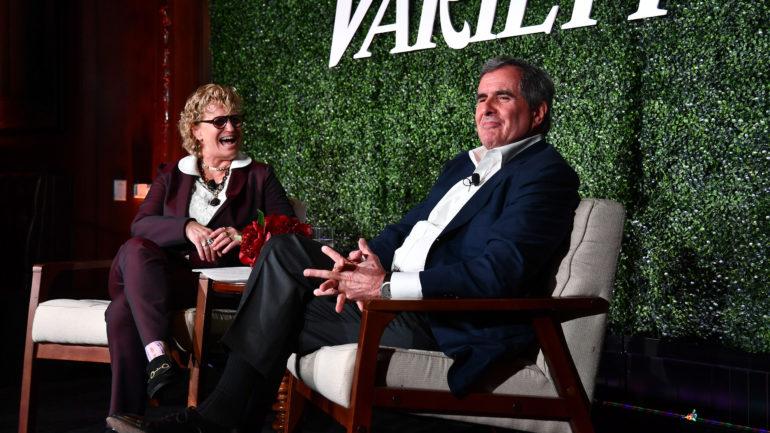Peter Chernin: ‘There’s No Reason Hulu Shouldn’t Be Netflix Today’
By Elaine Low
LOS ANGELES (Variety.com) – The Chernin Group head and former News Corp. exec Peter Chernin believes that Hulu, not Netflix, should’ve been the dominant streaming platform of the modern era, blaming Fox and NBC for diminishing the streaming service he helped launch in 2007 in a joint venture with then-NBCUniversal chief Jeff Zucker.
“The day we both left [around 2009/2010], both of those companies turned around and in some ways throttled Hulu,” he told Variety editor-in-chief Claudia Eller at the Variety Dealmakers Elite breakfast on Friday, alleging that Fox and NBC increased the ad load on Hulu and began holding back content. “Every single person at Fox hated Hulu,” he added.
“That should’ve been the dominant streaming platform,” said Chernin. “I would argue that their throttling of that in the four to five years after that is potentially one of the bigger mistakes that’s been made in the media business. There’s no reason Hulu shouldn’t be Netflix today. The fact that it isn’t is because they didn’t lean into it during that time. I think it’s a phenomenal lesson in how big companies should treat disruption. We’re in the midst of enormous disruptions, and if you think you’re going to protect yourself against this disruption, you’re out of your mind. You’re not, and your job at these companies is to lean into disruption and anticipate it before anybody else.”
Chernin had in 2013 bid for Hulu when the platform was put up for sale, before then-joint owners Fox, NBCU and Disney changed their minds and called it off.
In the years since Hulu and Netflix debuted on the market in the late aughts, the two services’ paths have diverged. Netflix has amassed 158 million subscribers globally, taking the lead in the streaming arena, while Hulu has pushed to grow to over 28 million subscribers , and is now fully under Disney’s operational control after being split between Disney, Comcast’s NBCUniversal, 21st Century Fox, and Time Warner for years.
Over the course of a sprawling hour-long conversation, Chernin kept coming back to the theme of disruption, and his belief that it is a challenging time to be small in the media business. With a few caveats, “there are no advantages to being small,” he said, nodding to the difficulties in competing against companies with a great deal of scale.
The and AT&T’s jointly formed Otter Media had amassed a portfolio that included digital media company Fullscreen, online subscription video service provider Ellation, anime streamer Crunchyroll, digital content studio and video network Rooster Teeth, and stakes in Gunpowder & Sky and Reese Witherspoon’s Hello Sunshine. Chernin Group sold its stake in Otter Media to AT&T in 2018.
“Most areas of consumer life feel ripe for disruption right now,” he said.
The Chernin Group’s investment portfolio currently includes Barstool Sports, The Athletic, Mitu, Scopely and Twitter. Chernin’s TCG in November closed a $700 million fund with commitments from investors; over the past seven to eight years, the company has taken an interest in entities such as meditation app Headspace, food site Food52, hunting and fishing content business MeatEater, and online wedding registry Zola, among others.
Many of those are notably not media entities. While Chernin is not intentionally shunning media investments at the moment, he says that “it’s not high on our list,” and believes that “there aren’t a lot of great opportunities at the check size which we like.”
“We are certainly focused on content-to-commerce, the ability of content to drive commerce, but pure media plays I think are challenging right now,” added Chernin. “That’s not to say we wouldn’t do them. But it is a time of enormous consolidation and scale in the media business.”
Praising Disney chief Bob Iger for his acquisitions of Pixar, Lucasfilm and Marvel, Chernin said Iger’s “real genius” was in using content to build other bigger businesses, pointing to Disney’s massive consumer products, theme parks and now direct-to-consumer businesses.
That is the business model being exploited by the major technology companies trying to find footing in the media space.
“You’re talking about some of the biggest companies in the world — Google, Apple, Facebook, Amazon — who are now saying, ‘We can afford to use content on what may appear to be a loss leader but will do the overall mothership so much good,’” he said. “And that is another huge paradigm shift.”
But that brings up a concern for Chernin, amid this vertically integrated landscape. The major players, he says, are better served by keeping their doors open to content from external suppliers even if that means relinquishing a certain amount of control.
“We are moving toward a world of four or five big walled gardens, of armed creating content just for themselves,” said Chernin. “They’ll never sell to each other, but also you’ll see them trying to buy less and less from third parties. I believe that’s bad for creativity. I believe that creativity flourishes with multiple outlets, in a certain amount of chaos.”

